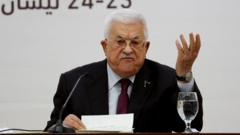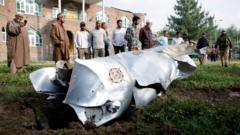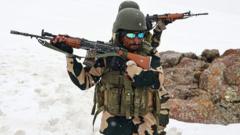In a forceful address, Abbas demands the release of hostages and calls on Hamas to disarm and hand over control of Gaza, escalating tensions among Palestinian factions.
**Abbas Slams Hamas in Rousing Speech Demanding Hostage Release**

**Abbas Slams Hamas in Rousing Speech Demanding Hostage Release**
Mahmoud Abbas accuses Hamas of prolonging Gaza conflict and calls for end to the group's armed presence.
Mahmoud Abbas, President of the Palestinian Authority, has delivered a fierce condemnation of Hamas during a recent meeting in Ramallah, describing the group as "sons of dogs" and demanding the prompt release of hostages. His remarks highlight the growing frustrations within the Palestinian leadership regarding Hamas's continued armed presence in Gaza and the ongoing conflict with Israel.
During the speech, Abbas asserted that Hamas has provided Israel with "excuses" to justify its military actions in Gaza. He urged the group to release the hostages it holds and to disarm, insisting that these steps are essential to concluding the war. This marked Abbas's strongest denunciation of Hamas since the outbreak of hostilities 18 months ago.
A spokesperson for Hamas reacted strongly to Abbas's comments, criticizing the derogatory nature of his language towards a significant segment of the Palestinian population. Tensions escalated last week when Hamas rejected an Israeli proposal that required the disarmament of the group in exchange for a temporary ceasefire and the release of hostages. Instead, Hamas has offered to return all hostages but only in return for a complete end to the conflict and withdrawal of Israeli forces.
The Palestinian Authority, led by Abbas and primarily controlled by his Fatah party, has faced criticism from Palestinians who argue that it lacks a strong influence in Gaza, especially since Hamas's takeover in 2007. Abbas claimed that Hamas's actions have essentially provided justification for Israeli attacks on civilians in Gaza.
As the conflict continues, reports indicate that Israeli airstrikes have resulted in significant casualties, including an airstrike on a school used as a shelter in Gaza City, which claimed multiple lives. The ongoing blockade and humanitarian crisis in Gaza have drawn international condemnation, with calls for Israel to allow aid to flow freely into the region. The humanitarian situation has deteriorated sharply, according to the UN, with many residents lacking basic necessities due to the blockade.
In conclusion, Abbas's speech represents a significant escalation in rhetoric against Hamas and highlights the deep divisions within Palestinian leadership, as both entities grapple with the ramifications of the continuing violence in Gaza.
During the speech, Abbas asserted that Hamas has provided Israel with "excuses" to justify its military actions in Gaza. He urged the group to release the hostages it holds and to disarm, insisting that these steps are essential to concluding the war. This marked Abbas's strongest denunciation of Hamas since the outbreak of hostilities 18 months ago.
A spokesperson for Hamas reacted strongly to Abbas's comments, criticizing the derogatory nature of his language towards a significant segment of the Palestinian population. Tensions escalated last week when Hamas rejected an Israeli proposal that required the disarmament of the group in exchange for a temporary ceasefire and the release of hostages. Instead, Hamas has offered to return all hostages but only in return for a complete end to the conflict and withdrawal of Israeli forces.
The Palestinian Authority, led by Abbas and primarily controlled by his Fatah party, has faced criticism from Palestinians who argue that it lacks a strong influence in Gaza, especially since Hamas's takeover in 2007. Abbas claimed that Hamas's actions have essentially provided justification for Israeli attacks on civilians in Gaza.
As the conflict continues, reports indicate that Israeli airstrikes have resulted in significant casualties, including an airstrike on a school used as a shelter in Gaza City, which claimed multiple lives. The ongoing blockade and humanitarian crisis in Gaza have drawn international condemnation, with calls for Israel to allow aid to flow freely into the region. The humanitarian situation has deteriorated sharply, according to the UN, with many residents lacking basic necessities due to the blockade.
In conclusion, Abbas's speech represents a significant escalation in rhetoric against Hamas and highlights the deep divisions within Palestinian leadership, as both entities grapple with the ramifications of the continuing violence in Gaza.


















